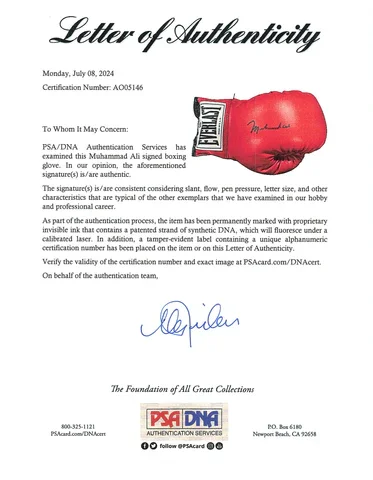As a professional charity auctioneer who has spent years working with nonprofits across North America, I’ve seen a lot of amazing fundraising moments — and unfortunately, I’ve also seen a lot of mistakes.
Recently, a friend I respect — someone I consider close — proudly posted a photo of what was described as the ultimate collectible: a boxing glove allegedly signed by Muhammad Ali, Joe Frazier, George Foreman, Mike Tyson, and Floyd Mayweather Jr.
At first glance, it looked impressive. But as an auctioneer and someone who knows the world of sports memorabilia, I felt sick. Why? Because I knew exactly what it was: a counterfeit consignment auction item being sold to charities and donors who don’t know the difference.
And that’s what this blog is about: protecting your charity, your donors, and your reputation from the dangers of fake charity auction items.
Why the “Boxing Legends Glove” Is a Perfect Example of a Scam
The glove in question claimed to have autographs from five of the greatest boxers in history. But when compared to authenticated signatures, none of them matched.
Even worse, every signature looked almost identical in size, ink, and style — something that never happens with authentic, multi-signed memorabilia.
Here’s the truth:
If a glove like this were real, it would be the only one in existence.
It would be a priceless museum piece, not something that quietly shows up at a random charity auction.
The reality? These gloves are fantasy pieces created to trick charities, sold with meaningless “certificates of authenticity.”
The Glitz and Glamour Trap
This is how nonprofits get caught: the glitz and glamour of flashy consignment auction items.
Counterfeiters know you don’t live in the world of autographed memorabilia. They know you don’t know which authentication companies are credible. They know you assume a “certificate of authenticity” makes it real.
They count on that lack of knowledge. And they use it against you — and your donors.
Why a COA Alone Means Nothing
I looked on the “Authentication Company” (the term is used loosely, I entered it into Google Earth and it brought me to this address. Google earth allows the user to look directly at the address in 3D and this (believe it or not) is what I found - it’s a UPS Store in New Jersey. Oddly enough, another “Charity Fundraising” company that is a documented counterfeiter only providing items to the charity world, also uses the same method in Fort Lee, New Jersey. Their address is also a UPS Store - in fact, I have been there in person. The “Suite #”, well that is a PO Box. Are you suspicious yet?
I can’t say this strongly enough: a Certificate of Authenticity (COA) means absolutely nothing if it’s not issued by a recognized authenticator.
Many fake “authentication companies” operate out of a UPS Store mailbox.
Real authentication comes only from PSA/DNA, JSA, or Beckett.
Each has online databases where serial numbers can be verified instantly.
Anything else is worthless — and dangerous to your charity’s reputation.
What Happens When Donors Discover the Truth
Imagine this scenario: a donor spends thousands at your silent or live auction, proudly taking home a “rare” item. Later, they learn it’s fake.
Who do they blame? Not the vendor. They blame you.
Your donor feels betrayed.
Your credibility takes the hit.
Your future fundraising suffers — because once trust is gone, it’s almost impossible to get it back.
This is why authentic consignment auction items matter more than ever.
How to Protect Your Nonprofit and Your Donors
Here’s what every nonprofit should do before accepting consignment auction items for fundraising events:
✅ Only work with vendors who provide authentic charity auction items backed by PSA/DNA, JSA, or Beckett.
✅ Verify the authenticator’s address — if it’s a UPS Store or P.O. Box, walk away.
✅ Check serial numbers in real authentication databases.
✅ Offer items that are proven winners: authentic autographed memorabilia, charity travel packages, and luxury silent auction items with guaranteed authenticity.
✅ Work with professionals — not only for items, but also for fundraising event planning and professional auctioneer services that maximize results.
Why Work With Me as Your Auctioneer
As an auctioneer and fundraising professional, I’ve built my career around protecting nonprofits from mistakes exactly like this.
At GeorgeWooden.com and through BW Unlimited Charity Fundraising, we provide:
Authentic consignment auction items for silent and live auctions.
Autographed sports memorabilia backed by our Authentication Guarantee.
Charity travel packages that donors love to bid on.
Fundraising event planning designed to maximize your results.
Auctioneer services that drive excitement, raise more money, and protect your reputation.
When you partner with me, you’ll never have to worry about fake memorabilia or donor trust being destroyed. Everything I provide is real, guaranteed, and proven to raise more money at fundraising events across North America.
👉 Learn more: www.GeorgeWooden.com






